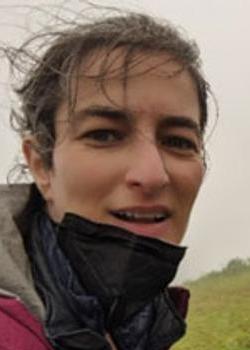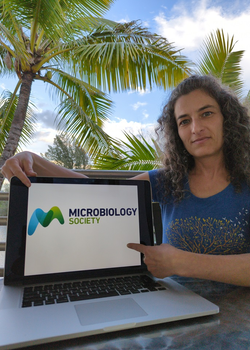Neurodiversity Celebration Week: Darya Chernikhova

Could you tell us about yourself?
I'm a master's student. I'm working towards cryopreserving biodiversity-related microbiomes. Just like humans have gut microbiomes, everything from wild animals to butterflies to plants and soils has microbiomes. Each microbial situation can have tens of thousands of individual species, bacteria, archaea, viruses, fungi, etc. We can't protect or restore biodiversity without paying attention to the microbiomes that go with it. Right now, most microbiome work is limited to sequencing or to isolating select bacterial species.
I'd like to create frozen living archives of whole microbiome samples. Currently, I'm on an internship in Hawaii, learning cryopreservation techniques.
It’s Neurodiversity Celebration Week 13–19 March 2023; will you be doing anything to raise awareness?
I feel like my very person creates awareness the moment I walk into a room.
I'm an oddball. I've started telling people that I'm neurodivergent as early as reasonably possible in a professional relationship. It doesn't help me succeed, but it does help me feel better about the process. I feel that announcing myself helps normalise difference and makes the world a better place. I tend not to do special things for specific occasions, but I do appreciate those occasions refreshing awareness and strength in my person.
As a neurodivergent person studying science, are there any challenges you have faced?
When I was an undergraduate, students chose a path and walked it. People could change careers but it was difficult and not celebrated. I couldn't find a mentor or a path in biology, so I moved into software and now I'm back at school.
Statistically, neurodivergent people take longer to find their paths, and tend to be older students. In some ways, today it’s easier. Young people often don't specialise and career changes are normalised. I finally got the right diagnosis, medication and coping strategies.
In other ways, it's harder. How do you ask for mentorship, when people don't see you as a mentee? You have had a lifetime of diverse hobbies and interests so you know how to help and how to contribute. However, you are still prone to burnout. You have the life experience to know where the right balances are, and that helps, but you are still human enough to not be able to reach them. There are special challenges – I can't be on time; my circadian rhythms are not on a 24-hour cycle. I have good days, when I'm a productivity superhero and bad days when executive dysfunction reigns. I'm sensitive to others' feelings, but can't always react appropriately in real time.
I can't represent myself in ways that generally get people accepted and promoted. Every professional field has its own social relationships and politics and I don't fit. You kind of just have to be strong and find your personal path, even when you know you're not likely to hit expected milestones. The hardest part is knowing when to quit. I've internalised that walking away is shameful, but now I try to think of it as walking towards something more fulfilling. When you clutch at something, you are wasting your potential. Don't be exhausted and dejected. Life's short, and you are enough. Find a place that makes you 5% happier, and the next, and the next. You will contribute to the world. It might take longer, or it might not, but it will be awesome.
Do you think more needs to be done to support neurodivergent people working in (or hoping to work in) science?
Gosh yes and there is so much intersectionality. Accommodations aren't handouts to ‘special’ people or a specific group. Rather, they are things that you can do to make your own environment function better. Take, for example, ageism: neurodivergent people, women, people of colour and those from working class backgrounds are all groups more likely to enter academia later in life. Many grants and scholarships for early career scientists carry a maximum age requirement. Trust me, I'm just as broke and enthusiastic.
When your organisation sees funding that carries an age limit, please respond to the granter and gently ask them to redefine ‘early career’ as "X years after graduation or of work in this field, excluding the years taken off for family or personal obligations". With enough supporting voices, things will change. Try not to give unsolicited common sense advice. We've tried it. But it's wonderful to offer mentorship. Give all accommodation requests that you are able to give, and don't compare individuals' accommodations or disabilities. Ask community-run support groups for advice. They have the context to suggest productive solutions. Implement diversity consultants' suggestions. When you step back and reassess how a person might work better in your environment, what you are actually doing is figuring out how your environment could work better.
Be flexible and innovative, and you'll be getting the best from all of your contributors. Communication: in a homogenous culture, folks have a narrow range of comfort in expression and of ‘outsiders’, whether these are neurodivergent people or people from other cultures or classes and, therefore, these people are pushed away. Neurodivergent people are used to code-switching, we adapt and translate. Trust us neurodivergent people to show you how to share.
Be uncomfortable. Every day. Get a calendar and check off the days when you've made yourself uncomfortable on behalf of a minority. Don't wait until you're secure enough in your position to really make a difference; you will never get there and you will be leapfrogging over the people you didn't speak up for. We don't have that choice of distancing or stopping to rest. Be an ally, and let's be tired but happy together.

Do you have any role models, if so, who?
I don't have heroes, but I do admire aspects of people. If I see a person be inventive or kind, I'll want to be like them in that regard. I met Glenn Seaborg once (element 106 is named after him). He gave a talk to our student group and he was so kind – it postponed my undergraduate burnout. I got to meet Eartha Kit after a concert (a brilliant performer and US Civil Rights activist). She was powerful, magnetic. Dr David Vaughan got me into corals and is a force of nature with a ‘can-do' attitude. My friend, Carrie Hawks, makes animated short films that talk so well about difficult topics. My friend, Sky, develops software for good causes. People in citizen science, people who do wonderful things without institutional support. I'd like to be like them.
Could you tell us why you decided to join the Society and become a Champion?
I was looking for mentors, and I wanted to contribute to diversity initiatives. The Society accepts people from all over the world, and everyone is so kind in emails and chat. I've been made to feel welcome. I'm glad it exists, and I'm glad to be hanging out with the Champions.
If you would like to get involved with Society activities, or become a Champion, you can find out more via our Get Involved webpage.
